In graphics: Big issues in European election
- Published
From 22-25 May voters in the EU's 28 member states elected their representatives in Europe. Their choices will affect 500 million EU citizens.
The European Parliament has greater powers than ever before, including influence over the EU budget, banking reform, agriculture and energy policy.
What does an examination of data reveal about key issues for Europe's voters?
Jobs
Reducing mass unemployment is one of the biggest challenges facing the EU. For many voters the top issue for Europe today is jobs.
These graphs show the impact of the debt crisis, austerity drive and recession on the eurozone (EA in the graph). Unemployment soared in Spain and Ireland after the property crash in those countries, while Greece shed thousands of public sector jobs under pressure from international lenders. Italy's recession has seen contraction in the public sector and the closure of many businesses.
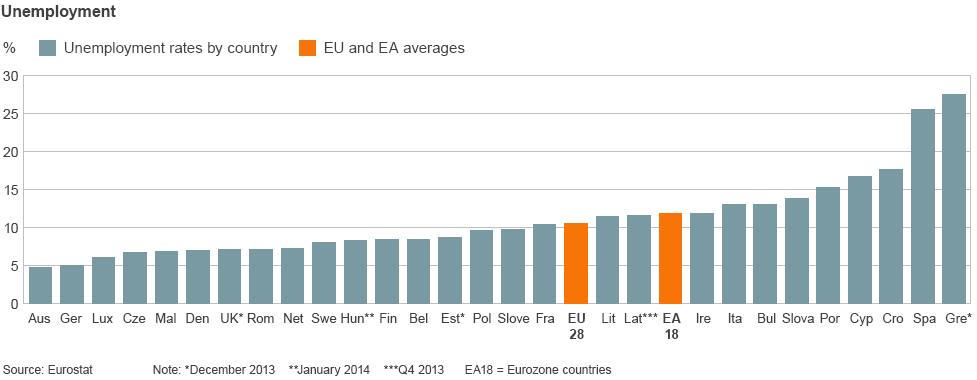
Getting a foot on the career ladder is a struggle for millions of young Europeans.
Youth unemployment has risen to record levels - above 50% in Greece and Spain. One of the EU's major problems is a mismatch of skills and job vacancies. For example, there is demand for engineers and software specialists in Germany, yet many of Europe's young jobseekers lack the necessary skills.
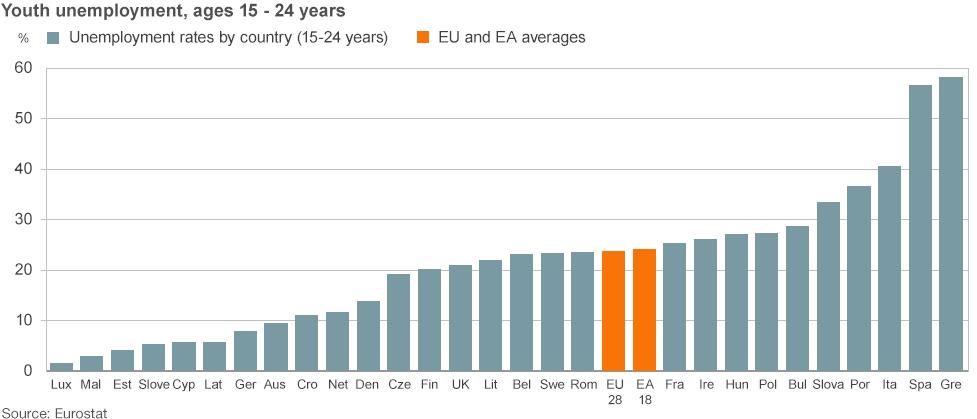

Sovereignty
Opinion polls suggest a growth in Euroscepticism across Europe.
In eurozone bailout countries - especially Greece, Cyprus and Portugal - the tough austerity terms imposed by the EU and International Monetary Fund have translated into negative feelings about "diktat" from Brussels.
In many countries, parties that want to reclaim powers from Brussels are more popular than ever. Notable among them is UKIP, which wants to pull the UK out of the EU. France and the Netherlands - founder members of the EU - have also seen a big swing towards Eurosceptic parties.
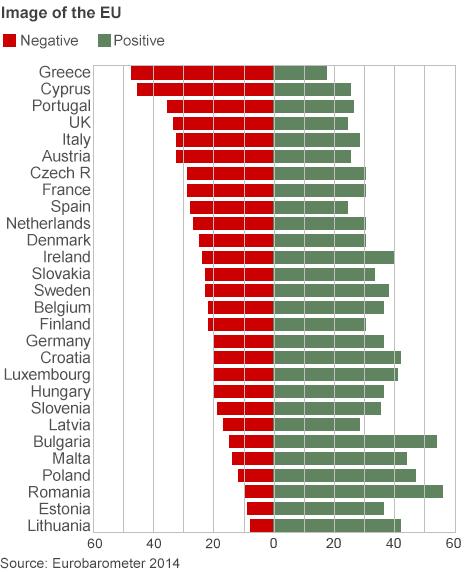
Negative feelings about the EU also translate into a high abstention rate at European elections. Turnout has fallen at every poll since the first in 1979. Many voters complain that they simply do not understand what goes on in Brussels, so they feel disengaged.
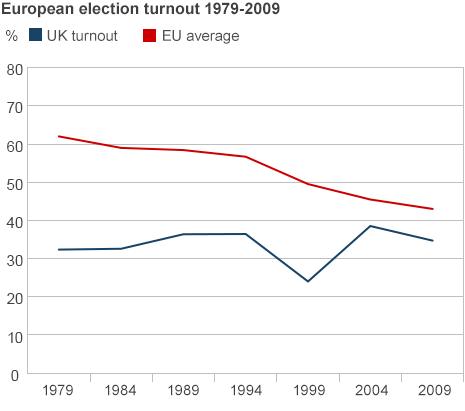

Migrants
The chart below shows the rise in migration, since 2007, from debt-ridden eurozone countries to industrialised countries where jobs are easier to find.
There is much concern about the growing economic gulf between northern and southern Europe. Immigration is a big election issue in many EU countries. Anti-immigration parties, complaining of foreigners "sponging" state welfare or "stealing" jobs, are expected to poll strongly - but many mainstream politicians also question the EU's core principle of freedom of movement.
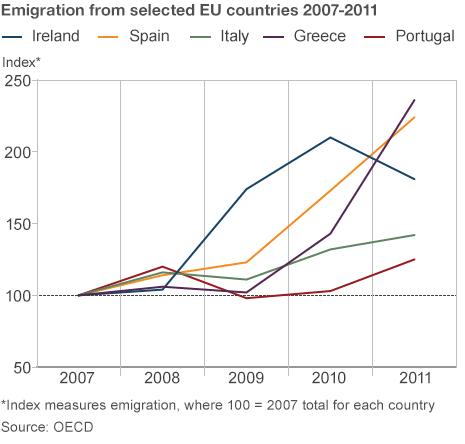
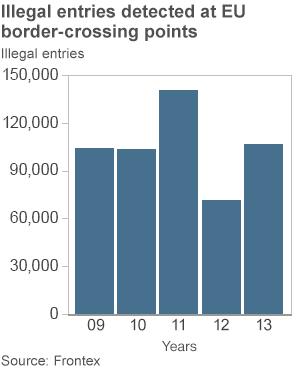
Immigration from outside the EU is also a concern in many countries. Controls have been tightened along the EU's external borders, as thousands of people fleeing poverty and persecution in Africa and Asia try to get in.
In recent months Italy and Malta have struggled to cope with a surge in migrant boats arriving from North Africa.
The EU's border agency Frontex has figures for those would-be immigrants detected - but many others manage to enter Europe undetected.
The devastating civil war in Syria has triggered a huge exodus of Syrians, some of whom have tried to reach Europe.
Afghanistan, plagued by violence and poverty, remains a top country of origin, while state repression in Eritrea encourages many people to seek a better life abroad.
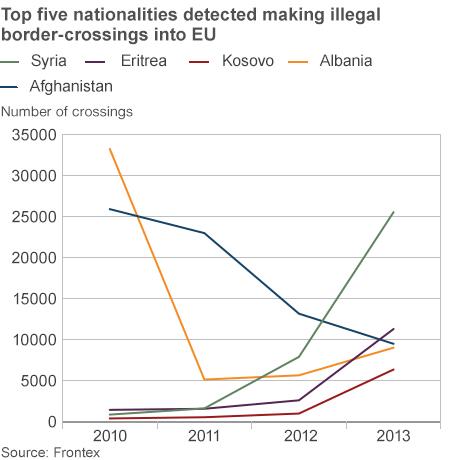

Energy
The cost of fuel is a big concern for many voters. In the UK and Germany - among many other countries - there has been much debate about rising household energy bills.
The crisis in relations with Russia has highlighted Europe's dependence on imported Russian oil and gas, and encouraged a diversification of sources. Cutting carbon dioxide (CO2) emissions to combat climate change is also a major driver away from fossil fuels.
The chart below shows the diverse pattern of energy consumption in Europe. For example, solid fuel - mainly coal - powers Poland far more than Sweden. The Nordic countries and Austria have embraced renewables - notably hydro and wind power - more than many of their neighbours.
Since 2011 Spain and Portugal have greatly increased electricity generation from renewables - mainly wind and solar. But last year the cash-strapped Spanish government drastically cut subsidies for renewables.
Nuclear power accounts for more than 75% of the electricity generated in France, but in Germany nuclear power is being phased out.
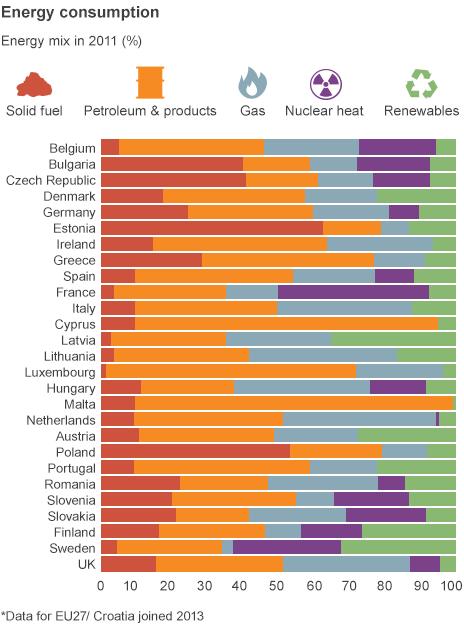
Vote 2014
